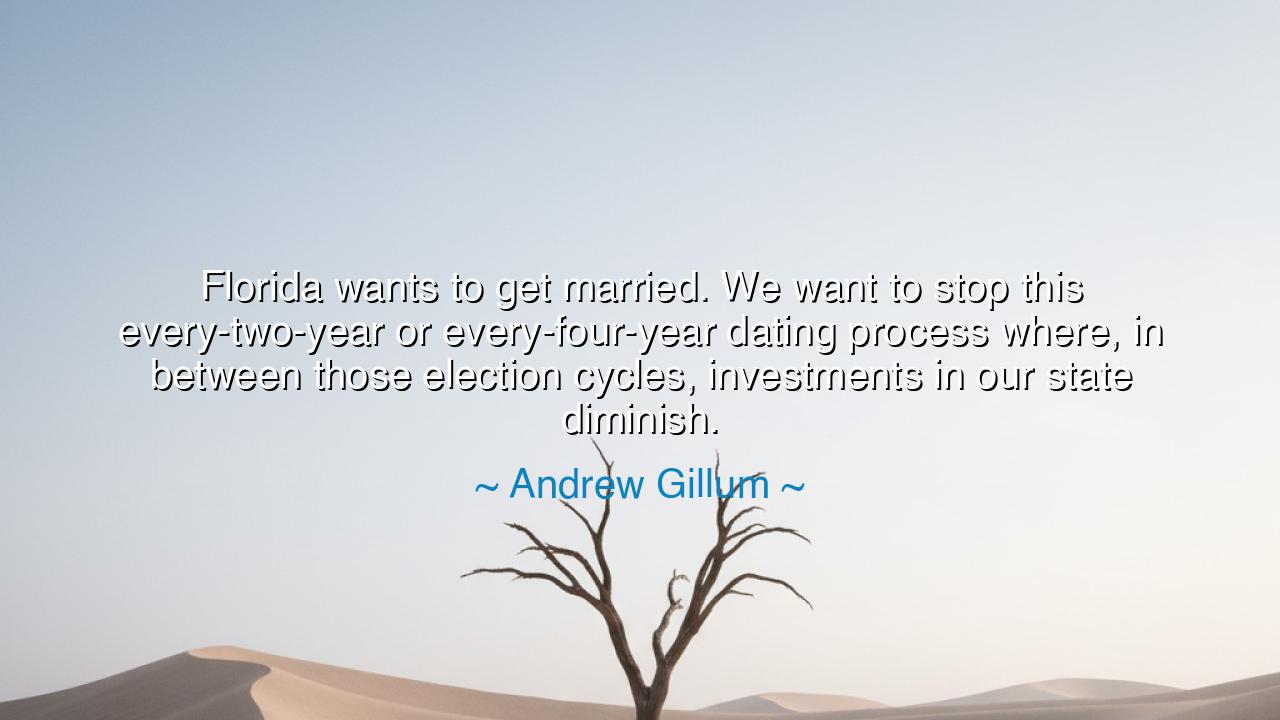
Florida wants to get married. We want to stop this every-two-year
Florida wants to get married. We want to stop this every-two-year or every-four-year dating process where, in between those election cycles, investments in our state diminish.






In the public square where slogans flare and fade like comets, Andrew Gillum speaks a steadier desire: “Florida wants to get married. We want to stop this every-two-year or every-four-year dating process where, in between those election cycles, investments in our state diminish.” Hear the metaphor ring—courtship versus covenant, flirtation versus fidelity. He is not talking of romance, but of governance; not of private vows, but of a public promise that outlasts campaign confetti. The meaning is clear: a commonwealth grows sturdy only when its leaders choose long horizons, not seasonally convenient affections.
Mark the craft of the image. Dating is episodic, breathless, performative; it spikes around anniversaries and vanishes between them. A marriage, by contrast, is ordinary holiness—bills paid on Tuesdays, roofs repaired before the storm, quiet plans kept when no one is watching. Applied to a state, the figure becomes rebuke and invitation: rebuke to the politics that arrives with bouquets and leaves with the budget; invitation to covenantal stewardship that tends schools, transit, water, and health all the days between the applause.
To name election cycles is to name the hunger that distorts the hand: when attention peaks, promises peak; when attention ebbs, maintenance withers. Roads crack, classrooms crowd, sea walls wait, and the ledger smiles only because it has postponed the truth. Gillum’s sentence asks for the opposite arithmetic—investments that keep faith in off-years, the quiet expenditures that never trend but always matter. He is saying: let the state be loved in the long winter, not only wooed in the bright spring.
Consider a story from our annals. In the early nineteenth century, New York chose covenant over courtship and built the Erie Canal—years of mud, debt, and quarrels, ending in a water road that rerouted a nation’s trade. No “dating process” produced that feat; it required a married patience: bond issues, steady labor, and a tolerance for unglamorous months when nothing seemed to move but the cost. The payoff endured for generations. So it is with every durable public good: the investments that look dull today become the arteries of tomorrow’s prosperity.
There is a humbler parable closer to home. A city once decided to replace its ancient water mains. No ribbon-cuttings, no skyline changes—only crews at dawn and traffic cones at noon. Voters grumbled; cameras yawned. Then summer came fierce and long, and that city alone did not ration showers or shutter factories. Why? Someone had chosen marriage—the labor of unseen care—over the dating thrill of prettier projects that would have photographed better. The lesson is not glamorous; it is true.
The origin of Gillum’s words belongs to the contested theater of modern campaigns, where a candidate for Florida’s highest office pleaded for policy that survives the ballot-counting night. “Florida wants to get married” is the voice of a steward, not a suitor; it insists that ports, wetlands, bridges, and classrooms cannot be loved in spurts. They need the slow grammar of budgets that recur, of plans that mature, of metrics that do not reset every election cycle as if the child were newborn and the shoreline unstudied.
Take from this a teaching worthy of elders: a polity is not a date; it is a household. Treat it so. Demand of your leaders vows, not vibes; schedules, not slogans; audits, not anecdotes. And when they bring you a plan that is boring and necessary, bless it. The future is built out of tedium redeemed—potholes filled, pipes replaced, teachers retained, wetlands restored—until one day the ordinary looks miraculous because it did not fail.
Practical rites for citizens and leaders alike: (1) Budget for the unsexy—maintenance lines in ink, protected from raids. (2) Tie investments to milestones that survive administrations—five-, ten-, twenty-year corridors with public dashboards. (3) Reward candor about costs; punish the sugar that postpones repair. (4) Keep a civic sabbath: a quarterly town reckoning where progress is measured when no polls are open. (5) Remember that marriage is choice remade daily—so with a state: recommit between Novembers, especially when no one is courting you. Do these, and the metaphor will turn real: Florida—and any place that listens—will cease to be a stage for episodic affection and become a home kept, steadily, for those yet to arrive.






AAdministratorAdministrator
Welcome, honored guests. Please leave a comment, we will respond soon